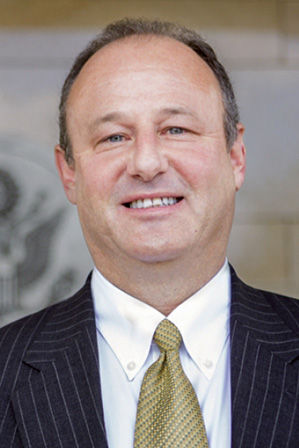Foreign Service Proud: Very, Very Proud
President’s Views
BY ERIC RUBIN

This month, we have the pleasure and privilege of honoring members of the Foreign Service community for special contributions to our Service and to our country’s security, prosperity and standing in the world. We are especially pleased to honor Ambassador Edward Perkins with the Lifetime Contributions to American Diplomacy Award celebrating his decades of public service and his dedication as a teacher, mentor and role model for current and future generations in the Foreign Service.
Sadly, Amb. Perkins left us last month at the age of 92. His was a great American life and a great Foreign Service life.
In the compelling interview with Amb. Perkins in this issue, he tells the story of calling on President Ronald Reagan before departing for Pretoria as the first Black U.S. ambassador to South Africa (those were the days when American presidents routinely met with their outgoing ambassadors, not just as a courtesy but as a sign of respect for the Foreign Service).
President Reagan asked Amb. Perkins what he hoped to achieve in Pretoria, and Amb. Perkins said boldly that he hoped to help end the system of apartheid. And he did exactly that.
Reading of the profiles of our award recipients, I am struck by their spirit of sacrifice, generosity and patriotism. The thought occurred to me: these are not cynical people. Like the Foreign Service as a whole, they are among the least cynical people I know.
The stories of how our colleagues helped bring home more than 100,000 of their fellow Americans when COVID-19 struck remind me of what service really means. Service in the face of danger, service to others, service to a larger ideal. We should be proud to uphold that vision, and we should keep it in mind as our country and the world navigate uncharted waters.
I am also gratified to know that the spirit of constructive dissent is still strong in our Service. As a recipient of the AFSA William R. Rivkin Award for Constructive Dissent myself, I know how intimidating it can be to challenge the system and challenge senior leaders. It is lamentable that there have been very few Dissent Channel messages sent in recent years, and that the Secretary’s Open Forum is leaderless and seemingly moribund. Both were a response to the difficult days of the Vietnam War, when members of the Foreign Service were unable to find a channel for expressing their constructive concerns about the war.
Some, like former National Security Adviser Anthony Lake (also featured in this month’s edition), resigned in frustration. Others suffered reprisals and in a few cases were the targets of wiretaps by State Department senior leaders.
The dissent awards we announce this month honor our colleagues who spoke up, constructively and internally, with the goal of advancing our national interest and improving our policies. They deserve our deepest thanks and respect.
Dan Serwer’s essay on the 25th anniversary of the Dayton Accords emphasizes that, at the end of the day, diplomacy is the chief alternative to war. It should help us remember the good that America and Americans can do in the world, and how much the world still needs us to lead despite our own political divisions and flaws. The Balkans are at peace today. It’s not a perfect peace, and there are still difficult challenges to overcome. Compared to the bloody days of the 1990s, however, it is something to be valued and cherished.
The hashtag #FSProud is just that—a hashtag. But it represents a lot more. We can and should feel justifiably proud of the contributions that members of our Service have made to advance our country’s interests and to make life better for others. We know it is not easy duty, and frequently comes with a heavy dose of sacrifice and danger.
We at AFSA are working hard to share the news of what the Foreign Service is doing: with the American public, with the media and with our representatives in Congress. I hope all of you will as well, as we begin a new year with hopes for health, safety and a return to prosperity for everyone.

